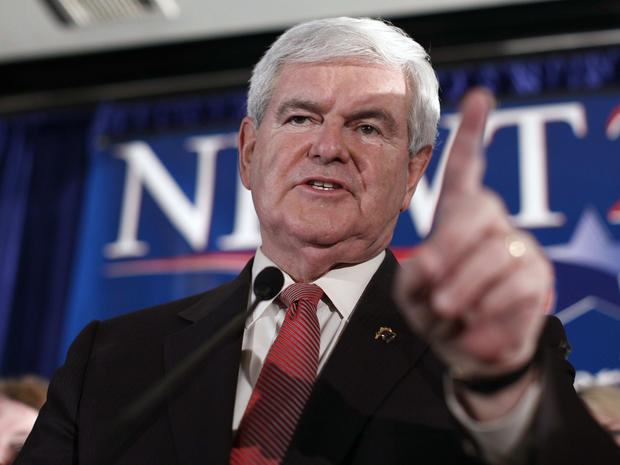Newt Gingrich taps into the power of resentment
Newt Gingrich was angry. Again.
The target this time: Mitt Romney. The former Massachusetts governor, he thundered during a campaign appearance in Florida on Thursday, won't tell voters about his past because "he is counting on us not having YouTube. That's how much he thinks we are stupid."
"We aren't stupid. The message we should give Mitt Romney is we aren't that stupid and you aren't that clever," Gingrich added.
Despite being perhaps the consummate Washington insider - a former House speaker who grew rich consulting for health care companies, the government-backed mortgage giant Freddie Mac and others - Gingrich has cast himself in his presidential bid as a vessel of conservative resentment against the "elites" in Washington.
"I am running for President to represent you, not to represent the Washington lobbyists, not to represent Goldman Sachs, not to represent the people who have been ruining this country," Gingrich said Thursday.
To paraphrase a quote often attributed to former President Bill Clinton, Newt Gingrich wants conservatives to know that he feels their pain.
That's a message that Romney - a technocratic, Massachusetts multi-millionaire whose patrician bearing screams "elite" - has a hard time sending. And that goes a long way toward explaining why Gingrich, despite his personal and professional shortcomings in the past, was able to beat Romney by double-digits in South Carolina.
Consider what happened in the Palmetto State last week. Just a few days before the primary, ABC News ran an interview with Gingrich's second ex-wife, who said that Gingrich, who has admitted extramarital affairs, sought an "open marriage" with her. That's the sort of thing you might expect would be a problem for the deeply socially-conservative South Carolina Republican electorate.
But in fact, the story may well have indirectly won Gingrich the state. Gingrich's thundering response to a question he deemed "despicable" at a debate last week garnered a standing ovation from the audience, and exit polls showed that the debates are what convinced many South Carolinians to back Gingrich. As it turned out, Gingrich's messy personal life was far less important to GOP voters than their anger at the elites in the media.
That "elite media" - along with the "elites in Washington and New York" and just plain old "elites" - took center stage in Gingrich's South Carolina victory speech. Those elites, he said, "have been trying for half century to force us to quit being American and become some kind of other system." Many Americans, he added, feel the elites "have no understanding, no care, no concern, no reliability and in fact do not represent them at all."
There is a certain irony to Gingrich's strategy, as the Washington Examiner's Philip Klein points out. The candidate often rails against President Obama for aping the radicalism of community organizer Saul Alinksy - but it is Gingrich who most directly apes the advice offered up by Alinksy in his book "Rules for Radicals," which recommends setting oneself up as the enemy of the establishment.
"The job of the organizer is to maneuver and bait the establishment so that it will publicly attack him as a 'dangerous enemy,'" wrote Alinsky, who added that his "notoriety and the hysterical instant reaction of the establishment not only validate my credentials of competency but also ensure automatic popular invitation."
Gingrich is not only trafficking in resentment against elites.He's also used rhetoric that some see as designed to exploit race-based resentment toward low-income Americans. Gingrich repeatedly accuses President Obama of being a "food-stamp" president, and said"the African American community should demand paychecks and not be satisfied with food stamps." He has also called on poor children to work as janitors in their schools because they lack a strong work ethic.
The comment prompted Juan Williams to ask Gingrichat a January 16 debate if he recognizes that the comments are "insulting to all Americans, but particularly to black Americans."
Williams' line of questioning - which included the comment that Gingrich's "food stamp president" line "sounds as if you are seeking to belittle people" - garnered boos from the debate audience. Gingrich's response that his comments were appropriate - he said at one point "I know among the politically correct, you're not supposed to use facts that are uncomfortable" - received a standing ovation.
The crucial test of how far Gingrich's politics of resentment will take him comes next Tuesday in Florida's January 31 primary. Gingrich has taken to casting Romney as an out-of-touch elite, someone who lives "in a world of Swiss bank accounts and Cayman Island accounts and making $20 million for no work." He's even criticizing Romney for owning stock in Freddie Mac, an audacious move in light of Gingrich's past work for the government-backed mortgage giant.
If Gingrich wins Florida on the back of such rhetoric, it may well set Gingrich on the path to the nomination - a prospect that has the conservative media in panic mode. That's partially because the politics of resentment that fire up the conservative base don't play nearly as well in a general election. (Gingrich's favorable rating, according to the Washington Post, is just 29 percent, while his unfavorable rating is 51 percent - though it's worth nothing that Romney's isn't much better.) The fear is that if Gingrich relies on the same rhetoric against the president that he has in the primary, he could alienate many Americans and ultimately lose big - dragging down Republican Senate and House candidates in the process.
